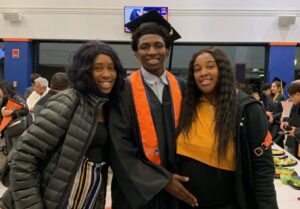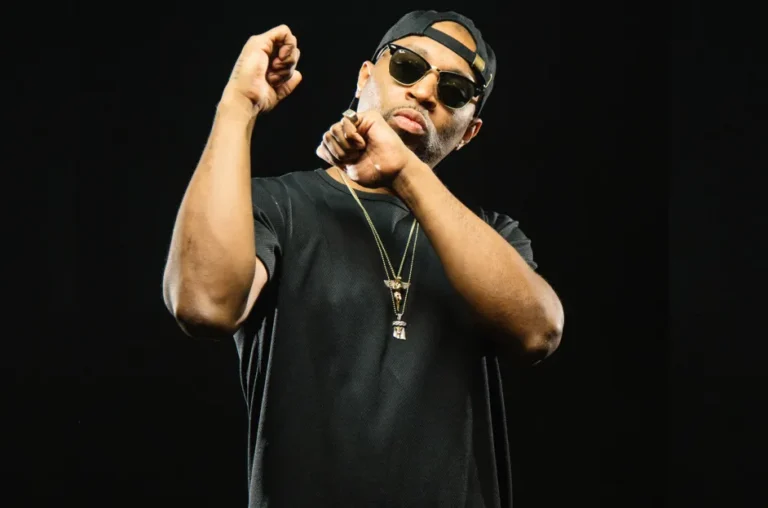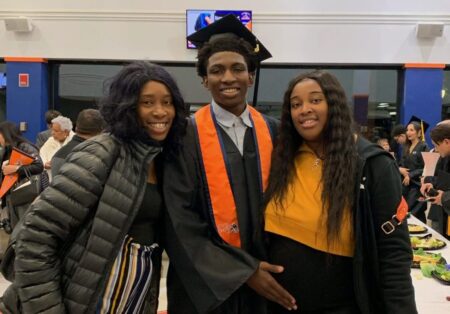The year is 2010, and the chorus from Waka Flocka’s hit, “No Hands,” is blaring from the floor speakers as the basement party fills with bass lines that can be heard from down the street. The dance floor is filled with a new enthusiasm immediately as Drumma Boy’s signature producer tag, “listen to this track, b*tch,” drops. Most millennials know this scene all too well.
Today, millennials tend to reminisce about the old days. And in those trips down memory lane, Drumma Boy’s beats often come up. From Gucci Mane’s “Photoshoot,” to Plies’ “Shawty,” the Grammy Award-winning producer’s catalog is one of the defining soundtracks of the 2010s.
The TRiiBE recently got a chance to talk to Drumma Boy, a hip-hop true pioneer and one of the greatest hip-hop producers of the mixtape era. On Oct. 17, 2023, he released his debut book, Behind The Hits, giving readers a inside look at his career, his life as a trailblazer, and insight on how he’s been able to accomplish the unthinkable. Drumma Boy was scheduled to do a book signing at Chicago’s Semicolon on Jan. 27., but canceled due to scheduling conflicts.
“I will rank this as honestly my best piece of work,” the 40-year-old Memphia native told The TRiiBE when talking about his book. “Putting the story behind it, like, a lot of people know the music, but learning about the person I think can help you interpret things differently”
In recent years, Memphis’ spin on hip-hop has made a resurgence, becoming a hotbed for talented artists and natural trendsetters, such as Pooh Shiesty, GloRilla, Duke Deuce, Key Glock, Moneybagg Yo and more. Although Drumma Boy, born Christoopher Gholson, moved to Atlanta in 2004 to further his career, he continues to represent Memphis to the fullest.
“Every picture you see me in, you see me throwing up Memphis. Every interview, you hear me talking about Memphis or who’s next,” he told The TRiiBE.
With all this talent based in Memphis, the musical city continues to build upon the legacy that Drumma Boy has built alongside other rappers and producers such as Three 6 Mafia, 8Ball & MJG, Jazze Pha, Young Dolph, and Yo Gotti, to name a few.
“Now you see people who are inspired and motivated by guys like myself, like, ‘I can make it out the city, too. I can make it, I can be successful.’”
Check out our interview with Drumma Boy
This interview has been edited for clarity and length.
The TRiiBE: Looking back on your career, what are you most proud of? Where does this book release rank on your long list of accomplishments?
Drumma Boy: Man, I will say what I am most proud of is helping people tell their story. As far as the book, Behind the Hits, I will rank this as honestly my best piece of work. A lot of people know the music, but learning about the person, I think, can help you interpret things differently and really understand, like, ‘damn, that’s his background, that’s where he came from, that’s how he was raised.’
Expound on that. What’s the most important thing you want readers to take away from this book?
Man, honestly, the knowledge, the game, but most importantly, the business. Learn the business. Appreciate the music. There’s a [college] course called Music Appreciation. There’s no reason why people should be in the music industry, but don’t have the appreciation for music. And there’s no reason why producers are sending out music through emails, and don’t copyright their music. That’s the cheapest, first step to do in the music game. Copyright your music. [It’s] $30, but nobody does it! So you send your music to all these people, you’re sending your songs to all these people via email, and then get mad when your music gets copied, or mad when your music is stolen. That’s what put me in a world of respect. People respect my business.
Second step is not delivering anything until an agreement is in place. What does that mean? Producer agreement. That ensures that this is the amount that I’m getting paid up front, this is my advance, this is my percentage on the publishing. If I didn’t do the music with anybody, 50% of the music is me. So, OK, I need that in writing. If I did do the beat with somebody, OK, it’s 25/25. [If] there’s three of us, it’s 33.3%. That business tactic needs to be understood. Having an entertainment attorney can take you to the next level. Imagine if I just sold the beat for “No Hands” [by Waka Flocka Flame featuring Roscoe Dash and Wale] exclusively for $1,200, or for $10,000, or even for $20,000. Now you eliminate the back end. “No Hands” went on to sell 10 million records, and helped me generate another extra couple million dollars. So now I can travel the world, I can attend events. I can attend these Revolt conferences. I can go to LA, I can work with this writers camp. That writers camp helped me bump into Chris Brown. That plane ticket allowed me to bump into different artists in LA that I wouldn’t have bumped into [by] staying in Atlanta. But when you sell your beats exclusively for $1,200 or $1,500, you miss out on another extra million dollars on the back end. So I think the business has allowed me to stay relevant, to take some of that money [and] hire a publicist. I wouldn’t be doing this interview with you if I didn’t have a publicist setting up and arranging these things.
How long did it really take you to get this business game down pat? Did you have it from the jump or did somebody pull you to the side?
Man, from the jump. I gotta thank a lady by the name of Wendy Day, [co-founder of] Rap Coalition. She BEEN giving us the cheat code. When I was 16 [or]17 years old, she would do free workshops to teach us the business, to teach us about publishing, to teach us the importance of P.R.O., or performance rights organizations, publishing, mechanical royalties, entertainment attorneys, [and] lawyers. The music business is 90% of the game. It’s one thing to have some hot beats, but how you gon’ market it? How you gon’ promote it? Who gon’ get the word out?
[Wendy Day] took her time to do free events for young Black men. Helping them teach the business and learn the business. So I owe a lot of that to her. That’s what really motivated me to major in music business in college at the University of Memphis.
You recently said that a part of your inspiration for coming out with the book was to put a face to your name. As music fans, we very rarely know what the producer looks like. When did you start noticing that your music was legendary, but people really don’t know what you look like? How important is producer visibility to you?
Man, honestly, as far as making money, the visibility didn’t really matter. My publishing and my business was more important. The most important thing [is] I’m getting my money. But as I would do interviews and what not, people would be familiar with the music, but not as familiar with me. [People would say], ‘it’s just my first time you know, putting a face with a name.’
So I started learning early [that] just putting a face with a name helps me make money. [Secondly], all your favorite producers, like Dr. Dre, Swizz Beatz, Kanye [West], Mannie Fresh, Jazze Pha, Timberland, you know them because they rap. They’re artists, too. The producers that are artists and rap, or sing, or are vocally heard on their tracks, you know them better. So I was, like, alright, that’s what I gotta do.
Once I started dropping the Welcome to My City [mixtape series], rapping on songs with Future, Yo Gotti, Beanie Segal and Junior Reed, that’s what really took me to the next level as far as people in the street and the underground [music world] being familiar with me.
The people who were fans of my music know what I look like. So now, writing the book was just helping people attach the music to my face.
Memphis has always been relevant as far as hip-hop is concerned. Even when you talk about rock ‘n’ roll, Memphis has always been relevant musically. But there’s been somewhat of a resurgence of Memphis artists in the mainstream music conversation in the last maybe five years or so. It’s like a real movement going on right now. As a Memphis native, what do you attribute this success to?
Man, [it was] us pioneers like myself, Three 6 Mafia, Juicy J and others just constantly repping Memphis, throwing up the city. Every picture you see me in, you see me throwing up Memphis. Every interview, you hear me talking about Memphis or who’s next. That’s what [my] Welcome To My City [mixtapes] was for, putting more spotlight on Memphis artists and helping them get the boost they need.
I was telling people about Young Dolph before the world knew about him. I introduced Dolph to Yo Gotti, Gucci Mane, 2 Chainz, [and] so many [other] people, just telling the world about him. Same thing for my city and [other] artists in the city like Jucee Froot, Action Packed AP, [and] Bighomie KDogg.
So now you see people who are inspired and motivated [by] guys like myself, like, ‘I can make it out the city too.’
Longevity is the word. The artists you came up with in the 2000s and 2010s, such as Jeezy, Gucci Mane, T.I., Kanye West, and Plies, what can you say is the biggest difference between those artists and the artists you work with today, such as rappers like NBA YoungBoy?
I think the biggest difference is the hustle. When I was coming up, or Gucci Mane was coming up, we were still putting out CDs. Today’s generation, they put out Instagram posts. They putting out TikToks. It’s not as physical as it used to be.
We still got to touch the streets. We still got to have street teams, and we still got to touch the DJs. But we’re also going to touch the social media platforms as well. You know what I mean? Social media is a part of marketing now, which didn’t exist when we were coming up. It just really comes down to, I think, your strategy with that, as well as utilizing some of the free marketing tools like the Instagram reels and the TikToks and things to help tell the story and make the records go viral.
Who have you been the most excited to work with, or who are you excited to work with now?
I will say now I’m excited about this 8Ball & MJG project. They gave me an opportunity to executive produce their album. So I’m executive producing their album. It is incredible. I just can’t wait ‘til y’all hear it and tell us what you think. But I’m super excited about that.
Upcoming artist 2KBABY is someone I’m working with and super excited about. There’s an artist named Fortune. They just signed to Future’s [record label], Free Band Gang. He’s from St. Louis.
Man, Dajulyn, another upcoming artist. [She’s] super dope.
Tell me more, if you can, about that 8Ball & MJG project that’s coming out soon. What role do you play in this?
Producing the music, producing everything and bringing a couple of producers that I felt needed to be on the project and delivering 8ball & MJG what I felt like they were missing.
The name of the album is Ike & Barry. Super excited, man. MJG always kind of had that eternal type of feel, and Ball always has been a Barry White fan. So Ike and Barry, is gonna be a classic.
When can we expect that?
That’s gonna be the first quarter 2024, probably by March.
The post Legendary hip-hop producer Drumma Boy says new book, ‘Behind The Hits,’ is his best piece of work appeared first on The TRiiBE.







